Super User
PulPac files patent for tool that further improves functionality and efficiency for Dry Molded Fiber
PulPac has just announced the filing of an additional patent application, further refining its pioneering cellulose forming technology for competitive fiber-based packaging and single-use products.
The new patent application comprises a hybrid tool that uses the pressing force to work in mould parts both in a pressing direction and in a lateral direction. The hybrid tool efficiently uses one pressing stroke for manufacturing a product having a general form in the pressing direction and a special feature such as for example undercut in the lateral direction. This is especially advantageous when manufacturing products like lids and other applications where e.g. stacking and denesting features are important. The hybrid tool also brings possibility of enhanced surface quality and improved tool life.
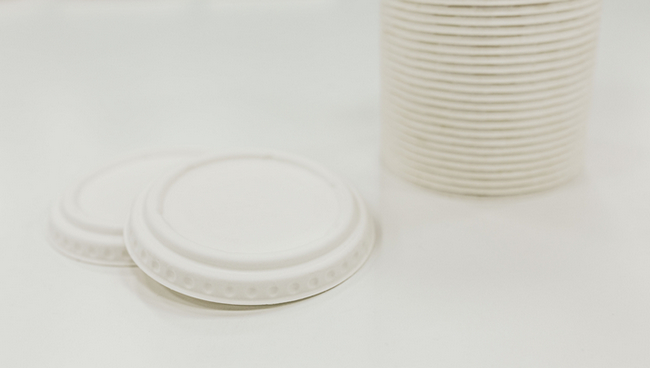
“Innovation is a core function at PulPac. It is at our heart and how we drive change for a sustainable future together with our clients. This patent application is a good example on how we continuously can refine and make Dry Molded Fiber even more effective or adapt it to specific demands or product applications” says Peter Ekwall, IP Manager at PulPac
Dry Molded Fiber is a fiber forming technology that can replace single-use plastic with sustainable fiber-based alternatives at low cost.
About PulPac
PulPac provides the packaging industry with a groundbreaking manufacturing technology for low-cost, high-performance fiber-based packaging and single-use products. By pioneering the technology of cellulose molding PulPac enables their customers to replace single-use plastics with a sustainable and cost competitive alternative globally. www.pulpac.com
About Dry Molded Fiber
Dry Molded Fiber, invented and patented by PulPac, is a manufacturing technology designed for the circular economy – using renewable pulp and cellulose resources to produce low cost, high performance, fiber-based packaging, and single-use products. Dry Molded Fiber gives up to 80-90% lower CO2 footprint at similar cost as plastic. It is up to ten times as efficient as conventional fiber molding invented over 100 years ago. The dry process also saves massive amounts of valuable water resources. In addition, energy savings are significant - as the molded products need no drying.
TotalEnergies withdraws from Myanmar
Following the coup of 1st February 2021 in Myanmar, TotalEnergies has firmly condemned on several occasions the abuses and human rights violations taking place there. Since then, our company's decisions have been guided by clear principles: to halt all our ongoing projects, but to continue to produce gas from the Yadana field, which is essential for supplying electricity to the local Burmese and Thai population, to protect our employees from the risk of criminal prosecution or forced labour, and, insofar as is materially and legally possible, to limit the financial flows received by the national oil company MOGE.
Despite the actions taken, TotalEnergies has not been able to meet the expectations of many stakeholders (shareholders, international and Burmese civil society organisations), who are calling to stop the revenues going to the Burmese state through the state-owned company MOGE from the Yadana field production. In fact, this is materially impossible for TotalEnergies, as most of the payments for the sale of the gas are made directly by the Thai company PTT, the buyer of the exported gas. TotalEnergies has also approached the French authorities to consider putting in place targeted sanctions that would confine all the financial flows of the various partners to escrow accounts without shutting down the gas production. TotalEnergies has not identified any means for doing so.
While our Company considers that its presence in a country allows it to promote its values, including outside its direct sphere of operations, the situation, in terms of human rights and more generally the rule of law, which have kept worsening in Myanmar since the coup of February 2021, has led us to reassess the situation and no longer allows TotalEnergies to make a sufficiently positive contribution in the country.
As a result, TotalEnergies has decided to initiate the contractual process of withdrawing from the Yadana field and from MGTC in Myanmar, both as operator and as shareholder, without any financial compensation for TotalEnergies. This withdrawal has been notified today to TotalEnergies' partners in Yadana and MGTC and will be effective at the latest at the expiry of the 6-month contractual period. The agreements also stipulate that, in the event of withdrawal, TotalEnergies' interests will be shared between the current partners, unless they object to such allocation, and that the role of operator will be taken over by one of the partners.
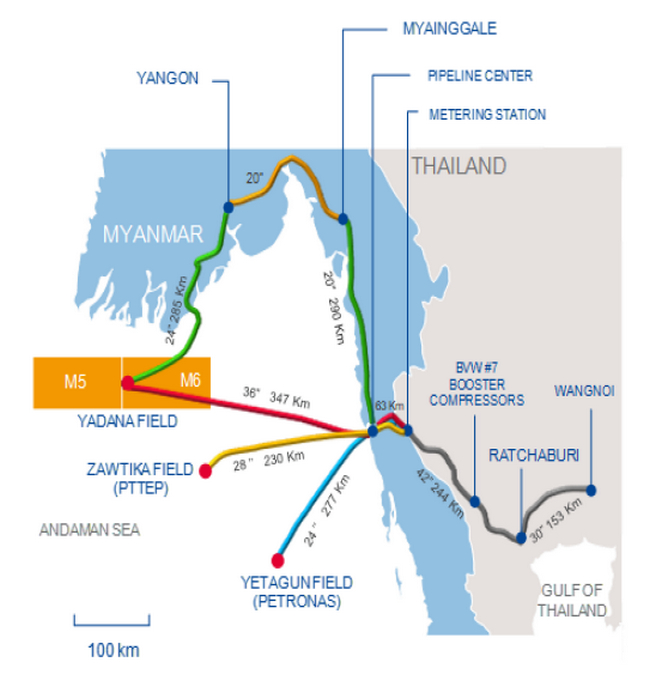
During this notice period, TotalEnergies will continue to act as a responsible operator in order to ensure the continuity of gas deliveries for the benefit of the population. TotalEnergies has indicated to its partners its willingness to ease the transition to the new operator and facilitate the transfer of staff who so wish.
About TotalEnergies in Myanmar
TotalEnergies has been a partner (31.24%) and operator of the Yadana gas field (Blocks M5 and M6) in Myanmar since 1992, alongside its partners Unocal-Chevron (28.26%), PTTEP (25.5%), a subsidiary of the Thai national energy company PTT, and the Burmese state-owned company MOGE (15%).
The Yadana field produces around 6 billion cubic meters per year of gas of which about 70% is exported to Thailand where it is sold to the national company PTT and 30% to the national company MOGE for domestic use. This gas helps to provide about half of the electricity in the Burmese capital Yangoon and supplies the western part of Thailand. Gas is exported to Thailand through a pipeline operated by MGTC that carries gas from the Yadana field to the Burmese-Thai border, over 400 kilometers. The shareholders of MGTC are the same as the partners in the Yadana field and in the same proportions.
About TotalEnergies
TotalEnergies is a global multi-energy company that produces and markets energies: oil and biofuels, natural gas and green gases, renewables and electricity. Our 105,000 employees are committed to energy that is ever more affordable, cleaner, more reliable and accessible to as many people as possible. Active in more than 130 countries, TotalEnergies puts sustainable development in all its dimensions at the heart of its projects and operations to contribute to the well-being of people.
AFRY achieves global top rankings in the Industrial Processes and Power sectors according to ENR
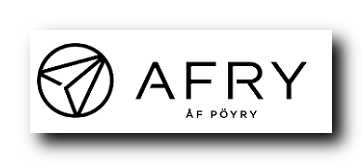 The Engineering News-Record (ENR) has presented the 2021 rankings for international top design firms in ENR Global Sourcebook. AFRY is ranked as #1 in the Pulp & Paper industry and #1 in the Power cogeneration sector, and has leading positions in several other sectors.
The Engineering News-Record (ENR) has presented the 2021 rankings for international top design firms in ENR Global Sourcebook. AFRY is ranked as #1 in the Pulp & Paper industry and #1 in the Power cogeneration sector, and has leading positions in several other sectors.
The ENR Global Sourcebook for 2021 is ranking companies based on an annual revenue of international businesses. A breakdown of sector rankings for AFRY in Industrial Processes and Power can be seen below:
Industrial Processes sector: AFRY #5
- Pulp & Paper: AFRY #1
- Food & Beverages: AFRY #2
- Chemicals (non-petroleum): AFRY #3
- Mining: AFRY #7
- Steel and non-ferrous metals: AFRY #9
Power sector: AFRY #6
- Cogeneration: AFRY #1
- Operations & Maintenance: AFRY #3
- Hydro: AFRY: #4
- Transmission & Distribution: AFRY #5
- Nuclear: AFRY #7
“These results showcase AFRY’s global market position as a key player in our core sectors. We are committed to support our clients in accelerating the transition towards a more sustainable society” says Jonas Gustavsson, President and CEO at AFRY.
Link to ENR global sourcebook 2021: https://www.enr.com/toplists/Sourcebook
About ENR:
Widely considered the industry benchmark, the annual ENR global sourcebook and top lists ranks international engineering and construction companies, based on revenue for industry sector and specific services performed in the previous year. ENR is an industry publication which focuses on providing news, data and analysis for industry professionals. The ENR outlet is well recognised throughout the construction and design industries.
AFRY is a European leader in engineering, design, and advisory services, with a global reach. We accelerate the transition towards a sustainable society.
We are 16,000 devoted experts in infrastructure, industry, energy and digitalisation, creating sustainable solutions for generations to come.
Making Future
KROHNE Highlights OPTIMASS Products, TSS 7000, and more at PROCESS EXPO 2022
KROHNE, Inc. announces it will highlight a range of innovative flowmeters for food applications at PROCESS EXPO 2022, which takes place February 15 – 16 at the Sacramento Convention Center in Sacramento, CA. Stop by Booth 609 to see KROHNE OPTIMASS Coriolis mass flowmeters in action, demonstrating continuous flow measurement, even with entrained gas and air of up to 100 percent (EGM™). Also on display will be OPTISENS TSS 7000.
The KROHNE OPTIMASS Coriolis mass flowmeters on display are ideal for all process and custody transfer applications. Measuring mass, volume flow, density and concentration of liquids and gases, OPTIMASS is available in several designs, from twin bent to single straight tube. All OPTIMASS flowmeters provide continuous flow measurement, even with entrained gas of up to 100 percent (EGM™). This makes them a great choice for dairy milk receiving, mayonnaise and shortening with up to 20 percent entrained nitrogen (N2), and ice cream overrun measurement applications.
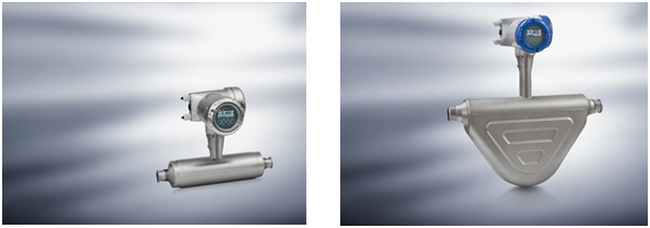
The OPTIMASS 1000 is designed with a close-coupled twin tube configuration with an optimized flow splitter, manufactured to be highly durable and capable of handling flow rates, even in the face of pressure fluctuations.
Also on display will be KROHNE OPTISENS TSS 7000, a total suspended solids sensor for hygienic applications. The sensor comes with Tri-Clamp or VARIVENT® connection and is particularly suitable for concentration measurement in milk separation, fruit processing and other food and beverage applications. However, it can also be the perfect fit for hygienic concentration measurement of other process industries (e.g. for monitoring steam and cooling water circuits).
About KROHNE
KROHNE is a worldwide technological leader in the development, manufacture and distribution of accurate, reliable and cost-effective measuring instruments for the process industries. KROHNE focuses on forming partnerships with its customers to provide them with the most reliable and innovative solutions available in the marketplace. For more information about KROHNE’s complete line of measuring instrumentation for the process industries, contact KROHNE at 1-800-FLOWING (978-535-6060 in MA); fax: (978) 535-1720, email: This email address is being protected from spambots. You need JavaScript enabled to view it., www.us.krohne.com.
Already more than thousand Valio dairy farms have reduced the carbon footprint of their milk production − the calculation provides direction for reducing emissions
The certified Valio Carbo® environmental calculator, developed for the Finnish climate and conditions, is used in monitoring the carbon balance of Valio dairy farms. In 2021, already more than thousand dairy farms, i.e. about a quarter of all Valio dairy farms, calculated the carbon footprint of the milk they produce. The calculated average carbon footprint of the milk produced at Valio dairy farms, i.e. raw milk, is 1.06 kilograms CO2e per litre. What makes the calculations significant is the fact that it covers 35 percent of the milk received by Valio and thus already about 28 percent of Finland’s total milk production. The global average carbon footprint of milk is about 2.5 CO2e per litre (FAO).
The goal of Valio’s climate programme is to reset the carbon footprint of milk’s value chain to zero by 2035. The biggest emissions reductions can be achieved at dairy farms because about 85-95 percent of all the climate impacts of milk are generated in primary production. Additionally, Valio’s goal is to significantly reduce emissions also in its own production, i.e. in its factories, transports, and packaging.
Carbon footprint calculation guides emissions reductions but reveals little about actual climate impacts
More than anything, the carbon footprint is a tool and a means for monitoring success in reducing emissions. However, the figure doesn’t necessarily give a good indication of the climate impacts of individual products.
Valio Development Manager Aleksi Astaptsev has been developing Valio’s carbon footprint calculation for four years now and has trained 1,800 Valio dairy farmers in the use of the environmental calculator. According to him, the individual carbon footprint figures for food products are, at worst, misleading and meaningless because they tell you nothing without context and information about how the calculation was made.
“A carbon footprint calculation can be done in many different ways, and the result depends on the method of calculation. Likewise, the production conditions at farms also impact the carbon footprint of milk. The carbon footprint of the milk transported to Valio’s dairies typically varies between 0.7–1.4 CO2e per litre. We make the calculation at the most accurate level possible and with the actual figures of each farm, rather than using figures based on estimates,” Aleksi Astaptsev explains.
In addition to different methods of calculation, soil impacts, i.e. how much the soil binds or releases carbon, are still missing from the life-cycle assessment of agricultural products. There still isn’t enough research data on how much carbon can be sequestered in mineral soil with year-round grass farming, and how much carbon is emitted from peatland cultivation. The carbon footprint calculation also doesn’t take into account nutritional values. Instead of individual products, the entire meal and its nutrients should be considered.
“We don’t eat kilos; we eat nutrients in an effort to get the most balanced nutrition possible. Comparing completely different kinds of products makes no sense because no one eats, say, a kilo of cheese or a kilo of potatoes a day. It’s the totality that matters,” Aleksi Astaptsev says.
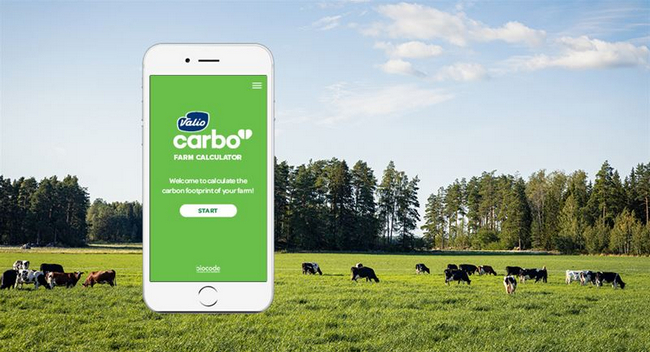
Dairy farmers have good feedback about the calculator
The Valio Carbo® environmental calculator gives dairy farmers an overall picture of the environmental impacts of their own farms: what has a big impact and what doesn’t. The result is comprised of the dairy farm’s activities: the carbon footprint is impacted by the number of arable hectares, the amount of grass farming, the number of cattle, the lifespan and productivity of the cows, the amount of energy and fuel used at the farm, and the forage fed to the cattle. The dairy farmers have provided very good feedback. The calculator is easy to use, and many dairy farmers are pleased when they see that the result is well below expectations.
“Finnish consumers are increasingly environmentally aware – which is purely a good thing. It is important to us that we can be part of the solution to the environmental impacts of food production and to produce milk for the products Finns can continue to buy with a good conscience also in the future. We believe that an increasing number of consumers value our work in sustainable food production,” says Rami Rauhala, a dairy farmer from Sievi.
“The target for 2021 was to have 500 dairy farms use the calculator. We are pleased that the interest in carbon footprint calculations has been so big that we doubled the target last year. Based on our target, all 4,000 Valio farms will have calculated their milk carbon footprint in 2024,” Aleksi Astaptsev adds.
No offset credits, just genuine actions to reduce own emissions
Aleksi Astaptsev feels that businesses should take ambitious actions to measure, report, and reduce their own emissions.
“Many products carry a label indicating that the product’s carbon emissions have been offset. Offset credits are typically allocated outside the production chain, e.g. to afforestation projects in developing countries. This does not change the actual carbon footprint of the product, and therefore, according to the Intergovernmental Panel on Climate Change (IPCC) guidelines, the offset credits should not be included in the carbon footprint, but should be referred to as carbon offsets. Producers should aim first to avoiding the generation of carbon emissions, then to reducing them, and only then to offsetting them,” he sums up.
Valio - The world’s most innovative dairy and food company
Valio’s mission is to create wellbeing and taste sensations in a responsible way. We make tasty products from milk and many other ingredients; we bring delightful tastes, variety and joy to the food table. We also carry out important roles in society: ensuring food security, enhancing public health and improving animal welfare are some examples of our impacts. In line with our mission, we are making life better. This is also the conclusion of the Finns who have chosen Valio as Finland’s most sustainable brand for seven consecutive years.
4,300 Finnish dairy farmers own Valio through cooperatives. We pay out all the profits to our milk producers through the milk price. We employ a total of 25,000 people at dairy farms. Valio has 4,000 professionals at work from different sectors and we listen to consumers with our more than 100 years of experience.Nobel Laureate A.I. Virtanen’s legacy continues to live on with us. When he headed Valio’s laboratories, the concept of improving the wellbeing of people took root as our guiding principle. We turn science into products that make life better. Consumers in more than 60 countries enjoy Valio products, and we have 350 patents for our innovations around the world. We are Finland’s biggest food exporter and a trailblazer for the whole food industry. Valio’s sales in 2020 were EUR 1,808 million.
Valio – Together we make life better.
Thermal fluid or steam?
Many of us start our day by walking to the kettle to make a tea or coffee. If you don’t clean the kettle, after a while you’ll probably see a build-up of limescale. If this happens to your kettle, you can repair or replace it for a low cost — when working with heat transfer systems, these options are far from inexpensive. Here Clive Jones, managing director of thermal oil supplier Global Heat Transfer gives advice on choosing the right heat transfer system for your application.
Manufacturers traditionally use steam for indirect heat transfer in industrial processes. Steam based systems heat water to boiling point by igniting a flame into tubes that are submerged in water, producing steam. The steam then condenses back into water that can be collected and used again. This system is often preferred because water is easy and cheap to acquire and has no perceived environmental impact.
Alternatively, thermal fluid-based heat transfer systems operate using a burner that heats a coil containing the fluid. A pump then circulates the fluid through the system and around the plant.
What are the costs?
Steam-based systems require additional equipment such as a surge tank, water softener and blowdown heat recovery technology, to operate effectively. This is partly because, to operate at the high temperatures required for industrial processes, steam systems must operate at high pressures of about 85 bars or 8,500 kPa.
If the steam reaches a critical pressure and the system has no way to vent it, it can cause pipes to burst, leading to costly downtime. Using steam-based systems may also put staff at risk — hot steam escaping from burst pipes or shrapnel from the burst pipe has the potential to harm employees. Operators must therefore continually monitor the system to keep employees safe.
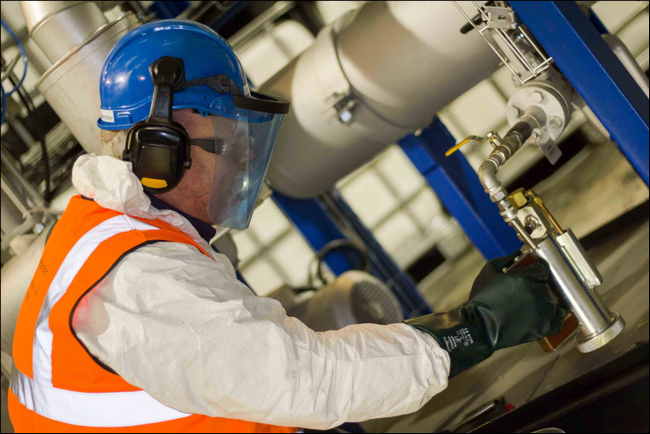
On the other hand, thermal fluid systems are simpler and cheaper because, unlike steam, they do not have to work at high pressure to maintain a constant temperature. Heat transfer fluids can operate at precise, high temperatures for extended periods of time and manufacturers can control the temperature depending on the application. These systems operate at atmospheric pressure and can easily be well vented, reducing pressure on pipes and improving safety for employees. While heat transfer systems may be the more efficient option, manufacturers should still carry out proactive maintenance. Monitoring thermal fluid condition with regular sampling and analysis enables manufacturers to identify and solve issues before they negatively impact production, preventing risks to safety and costly downtime.
Maintaining uptime and efficiency
Thermal fluids are more versatile, as manufacturers can select a fluid that is designed for a specific application, increasing its efficiency. There are a number of fluid options on the market, both synthetic and mineral, that have unique temperature ranges and recommended uses. For example, Global Heat Transfer supplies a range of high and low temperature heat transfer fluids, including Globaltherm® FG, a food-grade thermal fluid specifically manufactured for food and beverage processing, or Globaltherm® Syntec, a high temperature heat transfer fluid designed for use in the chemical industry. Manufacturers can work with a thermal fluid specialist to select a fluid that best meets the needs of their application.
Maintenance requirements
Water used in steam systems needs to be chemically treated to extend the lifespan of the system. However, corrosion is common, even in systems using distilled water, so operators must regularly monitor and maintain the system to reduce the risk of unexpected downtime.
Thermal fluids also require monitoring and maintenance because they degrade over time, particularly if running at high temperatures for long periods. For example, during the degradation process, thermal oils can be broken down into carbon molecules, which can stick to the pipes and reduce heat transfer efficiency. Regularly analysing fluids enables operators to monitor fluid condition and take any steps to slow down the degradation process, ensuring optimum efficiency.
Operators should also implement a proactive maintenance programme, such as Thermocare, which can include a remote monitoring solution that regularly monitors fluid. This sends instant alerts to site engineers when a sudden change occurs that may affect productivity, enabling companies to better manage their heat transfer fluid.
Overall, thermal fluid heating systems are safer, more efficient, cheaper to maintain and have better temperature control than using steam. Investing in thermal fluid heating systems prevents additional costs to maintain safety and efficiency, providing they are well maintained over time. So, you can sit back, relax, and pop the kettle on.
For more information on thermal fluid systems, and how to choose the right one visit: https://globalhtf.com/.
About Global Heat Transfer: Global Heat Transfer is a thermal fluid specialist, providing heat transfer engineering assistance and thermal fluid supplies. Services offered include sampling and analysis, 24 hour delivery of premium quality thermal fluids, system drain down / cleaning / waste management, planned maintenance programs and a broad portfolio of affiliated system design and installation services. It is part of the Global Group of companies.
Emerson to Help Accelerate Green Hydrogen Production
Automation technologies integral to world’s first offshore green hydrogen production process
Emerson (NYSE: EMR) is helping accelerate technology development for large-scale offshore green hydrogen production. The company is developing software and systems to enable safe and efficient operation of the world’s first offshore green hydrogen production process on an operational gas platform.
The PosHYdon project is a pilot that aims to validate the integration of offshore wind power and offshore natural gas and hydrogen production at sea – generating renewable fuels by harnessing a green energy source. The Neptune Energy-operated platform Q13a-A in the Dutch North Sea will host the project, which will provide insight into electrolyser efficiency from a variable power supply and the cost of installing and maintaining a green hydrogen production plant on an offshore platform.
Green electricity will be used to simulate the fluctuating supply from wind turbines and power the production process, which will convert sea water into demineralised water and then safely produce hydrogen via electrolysis. The hydrogen is then blended with the natural gas and transported to the coast, via the existing gas pipeline, and fed into the national gas grid. The 1 MW electrolyser is expected to produce up to three tons of hydrogen per week.
“Hydrogen is regarded as the ‘fuel of the future’, but with ambitious decarbonisation and net zero emission targets, it is essential to expand production capacity and accelerate the transition to hydrogen produced using sustainable energy,” said Mark Bulanda, executive president of Emerson’s Automation Solutions business. “Through the PosHYdon project, we – together with the consortium partners – hope to provide a pathway to large-scale offshore green hydrogen production and make a significant contribution to the energy transition process.”
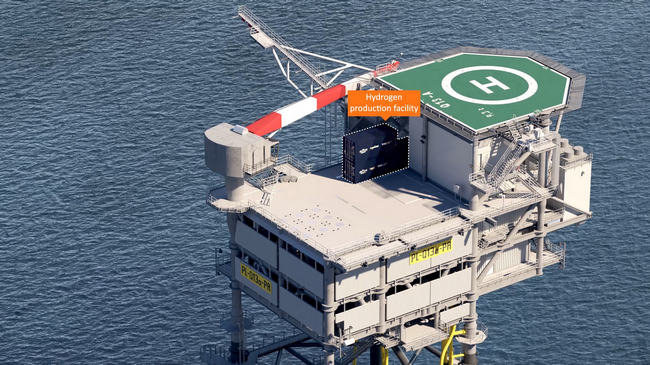 Neptune Energy-operated platform Q13a-A in the Dutch North Sea.
Neptune Energy-operated platform Q13a-A in the Dutch North Sea.
Emerson’s DeltaV™ distributed control system, DeltaV safety instrumented system and DeltaV Live operator interface software will manage the desalination and electrolyser units, gas blending and balance of plant equipment. By meeting the unique application challenges, including variable desalinated water feedstock and power supply, DeltaV software and systems will provide enhanced safety, process uptime and operational efficiency. The solution will ensure the existing natural gas operations remain unaffected and blended gas meets its required specification. Integration with the existing offshore systems and communication with onshore operations will maximise process visibility and prevent unforeseen issues.
“The PosHYdon project creates a unique opportunity to develop the steps required to ensure safe, large-scale green hydrogen production at sea,” said Bulanda. “Emerson’s experience across the hydrogen value chain, wind power and offshore energy industries will help achieve successful project execution, and our proven technology will ensure safe and efficient operations in this first-of-a-kind application.”
PosHYdon is being developed by consortium partners Nexstep, TNO, Neptune Energy, Gasunie, Noordgastransport, NOGAT, DEME Offshore, TAQA, Eneco, Nel Hydrogen, InVesta, Hatenboer, Iv-Offshore & Energy and Emerson. The project has been awarded a €3.6 million grant from The Netherlands Enterprise Agency (RVO) under the agency’s Demonstration Energy and Climate Innovation scheme, which invests in renewable energy developments, including hydrogen pilots.
About Emerson
Emerson (NYSE: EMR), headquartered in St. Louis, Missouri (USA), is a global technology and engineering company providing innovative solutions for customers in industrial, commercial, and residential markets. Our Automation Solutions business helps process, hybrid, and discrete manufacturers maximise production, protect personnel and the environment while optimising their energy and operating costs. Our Commercial & Residential Solutions business helps ensure human comfort and health, protect food quality and safety, advance energy efficiency, and create sustainable infrastructure. For more information visit Emerson.com.
IFF Announces New Investments in Next-Generation Starter Culture Development
IFF announced new investments in next generation starter culture development and technology. These include a new collaboration with the Technical University of Denmark (DTU) to develop cutting edge tools that will support the development of next generation starter cultures, and a production capability expansion plan.
Globally, consumers are demanding for more plant-based food and beverage products. The world of plant-based is however, extremely diverse and presents several challenges to researchers and developers. The collaboration with the DTU National Food Institute aims to develop tools to improve the fitness of strains for plant-based materials, maximize synergies across strains and gain better insights into the complexity of these materials. This partnership will help to enhance IFF’s existing portfolio of plant-based cultures.
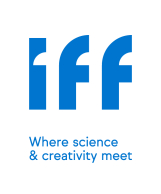 IFF will also make a significant investment to increase its production capabilities for plant-based starter cultures at its Dangé-Saint-Romain facility in France. The scale-up will allow the company to continue to meet the increased demand for plant-based starter cultures with its existing range of solutions.
IFF will also make a significant investment to increase its production capabilities for plant-based starter cultures at its Dangé-Saint-Romain facility in France. The scale-up will allow the company to continue to meet the increased demand for plant-based starter cultures with its existing range of solutions.
These investments in research and production capabilities will further strengthen IFF’s leading innovative plant-based solutions such as the Danisco® VEGE starter cultures, and services to help food and beverage producers stay ahead of consumer demand.
“Through our collaboration with a top-class research institute like the DTU National Food Institute, we are committed to support the plant-based industry with truly differentiated solutions,” said Jean-Philippe Obert, global R&D leader, Cultures & Food Protection, IFF. “With this partnership, we believe our investment in science and partnering with the world’s best experts will enable the necessary transition towards more sustainable food production.”
“IFF is uniquely positioned to excel in this field buoyed by this intensive research program, which will strengthen our existing culture offerings while allowing us to work on our synergistic ingredients concept. This joint research and our investment in increased production capacity both demonstrate our commitment that we are able to offer the most cutting-edge technologies to our customers who working to meet consumer demand,” said Eve Martinet-Bareau, global product manager, Cultures for Fermented Plant-based Food and Beverages, and Probiotics for Fermented Foods, IFF.
“We are excited to partner with IFF to research new and innovative solutions in the world of plant-based food and beverage,” said Claus Heiner Bang-Berthelsen, senior researcher, DTU National Food Institute. “This partnership will help to unfold the potential of plant-based materials towards safer, healthier, tastier and more sustainable food and presents a unique opportunity for creative problem-solvers to come together and make discoveries.”
IFF produces plant-based starter cultures that deliver sustainable innovations across a wide variety of food and beverage products. Learn more about the portfolio here https://www.iff.com/food.
About IFF’s Health & Biosciences division
Inspired by nature and distinguished by its world-class bioscience and microbiome capabilities, IFF’s Health & Biosciences (H&B) platform is a leading innovation partner for customers across a broad range of consumer product, industrial and agricultural sectors. H&B works closely with our customers to enhance products – and their processes – to deliver safer, healthier and more sustainable solutions.
Welcome to IFF
At IFF (NYSE: IFF), an industry leader in food, beverage, health, biosciences and sensorial experiences, science and creativity meet to create essential solutions for a better world – from global icons to unexpected innovations and experiences. With the beauty of art and the precision of science, we are an international collective of thinkers who partners with customers to bring scents, tastes, experiences, ingredients and solutions for products the world craves. Together, we will do more good for people and planet. Learn more at iff.com
©2021 International Flavors & Fragrances Inc. (IFF). IFF, the IFF Logo, and all trademarks and service marks denoted with ™, SM or ® are owned by IFF or affiliates of IFF unless otherwise noted. All Rights Reserved.
Mix to the max at Yorkshire Water’s major new Energy & Recycling Facility
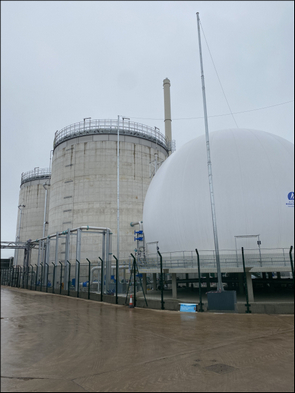 At Yorkshire Water’s new £50M Huddersfield Energy and Recycling Facility (E&RF), Landia’s digester mixing system ensures that total gas production can reach its anticipated 22,192Nm3d (normal cubic meterday)At Yorkshire Water’s new £50M Huddersfield Energy and Recycling Facility (E&RF), the digester mixing system from Landia is ensuring that total gas production can reach its anticipated 22,192Nm3/d (normal cubic meter/day).
At Yorkshire Water’s new £50M Huddersfield Energy and Recycling Facility (E&RF), Landia’s digester mixing system ensures that total gas production can reach its anticipated 22,192Nm3d (normal cubic meterday)At Yorkshire Water’s new £50M Huddersfield Energy and Recycling Facility (E&RF), the digester mixing system from Landia is ensuring that total gas production can reach its anticipated 22,192Nm3/d (normal cubic meter/day).
Designed, constructed and commissioned by J. Murphy & Sons Ltd (JMS), the Huddersfield E&RF is an integral part of Yorkshire Water’s long-term bio-resources upper quartile efficiency strategy.
Externally mounted on each of the two 7,306m3 concrete digesters, that contain thickened sewage sludge of up to 8 percent dry solids (DS), the Landia mixing system makes future servicing easy because there are no moving parts inside the tanks. Benefitting from the Landia chopper pump, which together with venturi nozzles ensures that the digesters are comprehensively mixed to maximise gas production, the mixing system is low on energy consumption and also reduces health and safety issues such as working from height.
A spokesperson for Yorkshire Water commented, “We are very proud of our new Huddersfield Energy and Recycling Facility, which is comfortably meeting all its performance targets. This impressive new facility will play a big part in helping us achieve net zero carbon by 2030”.
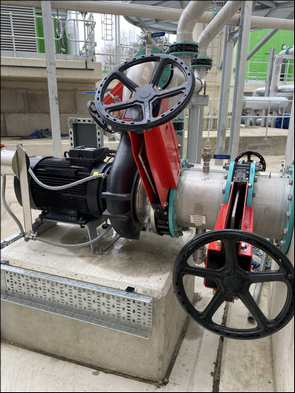 The Landia mixing system is low on energy consumption John Smith, Project Director for J. Murphy & Sons, added: “Huddersfield E&RF shows the quality of the process engineering expertise that we can deliver for complex water and wastewater design and construction. We understand that a good digester mixing system is very important to the success of an AD plant, so are pleased to see that our decision to choose Landia is paying benefits”.
The Landia mixing system is low on energy consumption John Smith, Project Director for J. Murphy & Sons, added: “Huddersfield E&RF shows the quality of the process engineering expertise that we can deliver for complex water and wastewater design and construction. We understand that a good digester mixing system is very important to the success of an AD plant, so are pleased to see that our decision to choose Landia is paying benefits”.
Created as a regional sludge treatment facility to receive indigenous and imported sludge in both liquid and cake forms, Huddersfield E&RF has enabled Yorkshire Water to treat all of its sludge by anaerobic digestion.
The sludge load to the digesters is 24,000tDS/annum (total dry solids) or 65.753tDS of sludge per day, including up to a maximum of 11.880tDS per day of imported liquid sludge and 25.831tDS per day sludge cake respectively.
Two CHP engines produce peak electrical output of 2390 kWh and a thermal output of 2404 kWh.
Landia +44 (0)1948 661 200
Alfa Laval first to launch a premium separator range for single-use pharmaceutical processing
Alfa Laval is the first manufacturer to introduce a new unique single-use separator range – Alfa Laval CultureOne Maxi – for biopharma processing that will cover the range from lab scale up to large production. All product-contact parts in the separator system can be replaced after each batch, eliminating the risk of cross-contamination, and increasing process hygiene and safety.
In 2020, Alfa Laval launched the first premium separator for single-use biopharma processing in small scale production. Based on the positive market reception the company is now expanding the offering to a range of single-use separators covering the scope from small lab production up to large scale processing.
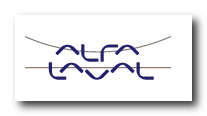 Until recently, single-use disc-stack separators did not exist on the market. This forced manufacturers to choose less efficient alternatives for cell harvesting. Now the unique single-use range, based on Alfa Laval’s 130 years of experience in separation technology and developed in close contact with Alfa Laval’s biopharma customers, eliminates the need for onsite cleaning and sterilization – and thereby the associated consumption of chemicals, water and energy.
Until recently, single-use disc-stack separators did not exist on the market. This forced manufacturers to choose less efficient alternatives for cell harvesting. Now the unique single-use range, based on Alfa Laval’s 130 years of experience in separation technology and developed in close contact with Alfa Laval’s biopharma customers, eliminates the need for onsite cleaning and sterilization – and thereby the associated consumption of chemicals, water and energy.
“Today ‘health and safety’ is at the top of everyone’s agenda, so is the importance of more sustainable living. I am pleased to announce the launch of this new product range that addresses these points. Single-use systems enable our pharmaceutical customers to produce more medicines and bring them to market safely and quickly. In addition, all product-contact parts in the CultureOne range are made from recyclable material. which is good for society,” says Nish Patel, President of the Food & Water Division.
Did you know… Alfa Laval CultureOne™ is used in processes for harvesting fragile cell cultures which are later used for injectable drugs for treating life-threatening illnesses including cancer and to counter organ transplant rejection.
This is Alfa Laval
Alfa Laval is a world leader in heat transfer, centrifugal separation and fluid handling, and is active in the areas of Energy, Marine, and Food & Water, offering its expertise, products, and service to a wide range of industries in some 100 countries. The company is committed to optimizing processes, creating responsible growth, and driving progress to support customers in achieving their business goals and sustainability targets.
Alfa Laval’s innovative technologies are dedicated to purifying, refining, and reusing materials, promoting more responsible use of natural resources. They contribute to improved energy efficiency and heat recovery, better water treatment, and reduced emissions. Thereby, Alfa Laval is not only accelerating success for its customers, but also for people and the planet. Making the world better, every day.
Alfa Laval has 16,700 employees. Annual sales in 2020 were SEK 41.5 billion (approx. EUR 4 billion). The company is listed on Nasdaq Stockholm.
